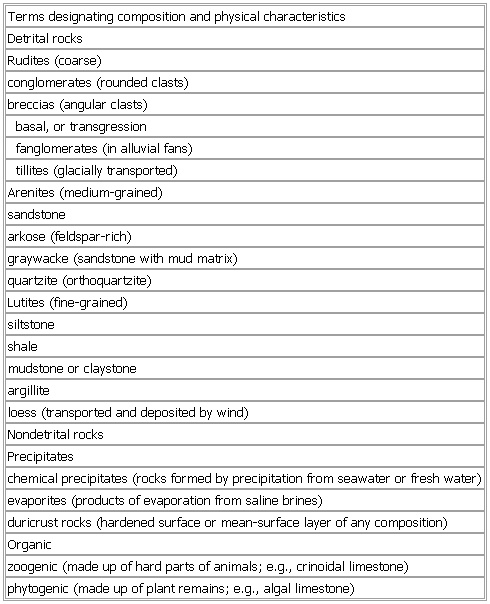Terms designating composition and physical characteristics
- Terms designating composition and physical characteristics
-
Terms designating composition and physical characteristics
Detrital rocks
conglomerates (rounded clasts)
breccias (angular clasts)
basal, or transgression
fanglomerates (in alluvial fans)
tillites (glacially transported)
Arenites (medium-grained)
sandstone
arkose (feldspar-rich)
graywacke (sandstone with mud matrix)
quartzite (orthoquartzite)
siltstone
shale
mudstone or claystone
argillite
loess (transported and deposited by wind)
Nondetrital rocks
Precipitates
chemical precipitates (rocks formed by precipitation from seawater or fresh water)
evaporites (products of evaporation from saline brines)
duricrust rocks (hardened surface or mean-surface layer of any composition)
Organic
zoogenic (made up of hard parts of animals; e.g., crinoidal limestone)
phytogenic (made up of plant remains; e.g., algal limestone)
See as table:
* * *
Universalium.
2010.
Look at other dictionaries:
sedimentary rock — Rock formed at or near the Earth s surface by the accumulation and lithification of fragments of preexisting rocks or by precipitation from solution at normal surface temperatures. Sedimentary rocks can be formed only where sediments are… … Universalium
Plato: metaphysics and epistemology — Robert Heinaman METAPHYSICS The Theory of Forms Generality is the problematic feature of the world that led to the development of Plato’s Theory of Forms and the epistemological views associated with it.1 This pervasive fact of generality appears … History of philosophy
JEWISH AND ISLAMIC LAW, A COMPARATIVE REVIEW — The Relationship between Jewish and Islamic Law Comparative studies in the field of Jewish and Islamic Law began more than 150 years ago with the publication of Abraham Geiger s Was hat Mohammed aus dem Judenthum aufgenommen (1833, rev. 1902).… … Encyclopedia of Judaism
arts, East Asian — Introduction music and visual and performing arts of China, Korea, and Japan. The literatures of these countries are covered in the articles Chinese literature, Korean literature, and Japanese literature. Some studies of East Asia… … Universalium
South Asian arts — Literary, performing, and visual arts of India, Pakistan, Bangladesh, and Sri Lanka. Myths of the popular gods, Vishnu and Shiva, in the Puranas (ancient tales) and the Mahabharata and Ramayana epics, supply material for representational and… … Universalium
Judaism — /jooh dee iz euhm, day , deuh /, n. 1. the monotheistic religion of the Jews, having its ethical, ceremonial, and legal foundation in the precepts of the Old Testament and in the teachings and commentaries of the rabbis as found chiefly in the… … Universalium
cosmos — /koz meuhs, mohs/, n., pl. cosmos, cosmoses for 2, 4. 1. the world or universe regarded as an orderly, harmonious system. 2. a complete, orderly, harmonious system. 3. order; harmony. 4. any composite plant of the genus Cosmos, of tropical… … Universalium
language — /lang gwij/, n. 1. a body of words and the systems for their use common to a people who are of the same community or nation, the same geographical area, or the same cultural tradition: the two languages of Belgium; a Bantu language; the French… … Universalium
japan — japanner, n. /jeuh pan /, n., adj., v., japanned, japanning. n. 1. any of various hard, durable, black varnishes, originally from Japan, for coating wood, metal, or other surfaces. 2. work varnished and figured in the Japanese manner. 3. Japans,… … Universalium
Japan — /jeuh pan /, n. 1. a constitutional monarchy on a chain of islands off the E coast of Asia: main islands, Hokkaido, Honshu, Kyushu, and Shikoku. 125,716,637; 141,529 sq. mi. (366,560 sq. km). Cap.: Tokyo. Japanese, Nihon, Nippon. 2. Sea of, the… … Universalium

